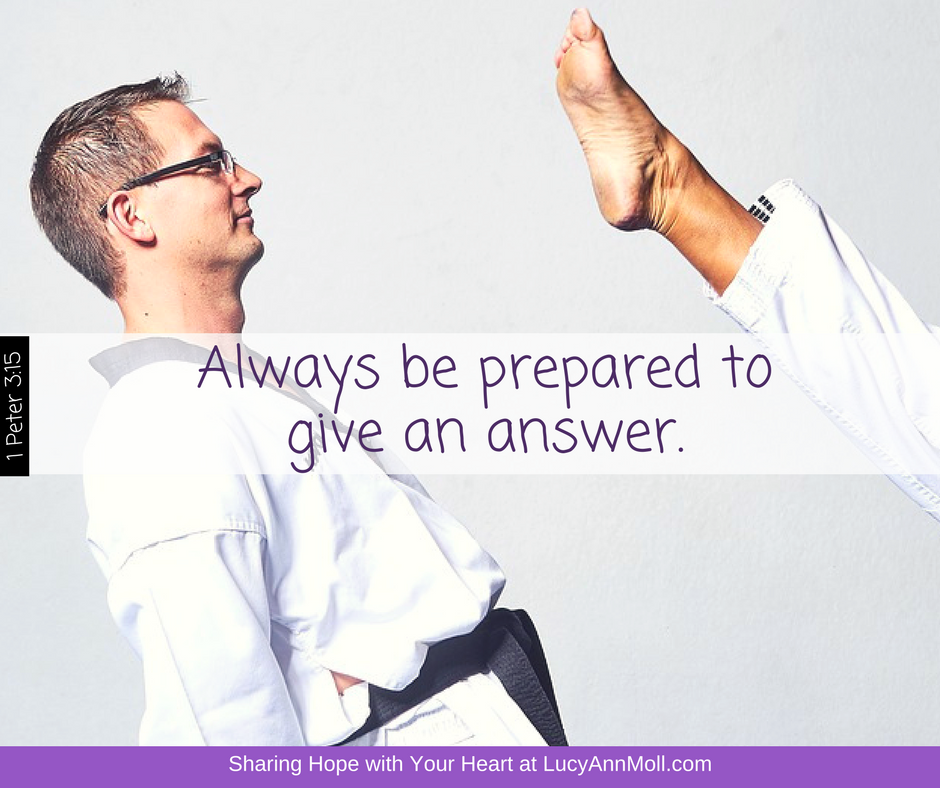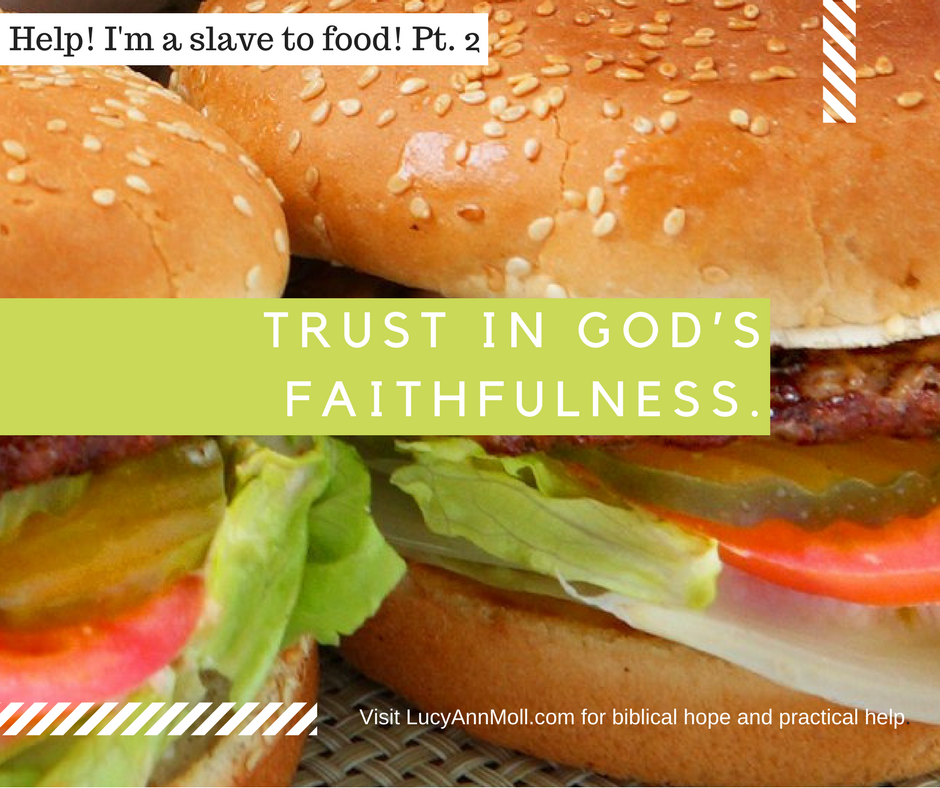by Lucy | Sep 21, 2017 | biblical counseling, emotions, relationships, whole health wellness |
 At my black belt Karate test, the strange thing happened. Near the end, after breaking four wood boards — elbow strike, front kick, palm strike, and hammer kick — I proclaimed Christ.
At my black belt Karate test, the strange thing happened. Near the end, after breaking four wood boards — elbow strike, front kick, palm strike, and hammer kick — I proclaimed Christ.
As it turns out, the black test test was a faith test!
Click & Tweet!
In this short article, you’ll learn–
- A key passage of encouragement to share your faith.
- 3 simple steps to proclaiming Christ wherever God leads you.
Have you, too, proclaimed your faith in an unlikely place? Perhaps at your children’s secular school? Or among friends at a coffee shop? Or while waiting in line at Starbucks?
Key Passage of Encouragment
Scripure commands you and me to be prepared to give a reason for our hope.
But in your hearts revere Christ as Lord. Always be prepared to give an answer to everyone who asks you to give the reason for the hope that you have. But do this with gentleness and respect. 1 Peter 3:15
I never expected to share my faith at my black belt test. I had gotten into karate for two reasons: to learn self-defense and to do an activity with my then 10-year-old daughter. We both earned orange belts. But she quit. And I kept kicking, blocking, punching, and flipping by little heart out.
Empowered to Speak!
Seven years and many colored belts later, as the black belt neared its end, the ten or so testers peppered us students with questions. And I remembered the passage: “Always be prepared to give an answer to everyone who asks you to give the reason for your hope.”
So when I heard the questions, they seemed to come from an evangelism playbook. And God encouraged me to share the reason for my hope.
The black-belted Kungfu Panda lookalike queried, “Lucy, How have you incorporated the philosophy of ying and yang in your karate?”
I hesitated,
breathed deep,
and spoke my heart.
“This is a difficult question,” I began. “I know how to answer the question the right away — yin and yang means balance, and all that — but I don’t believe it.
“So I’ll tell you what I do believe.
“I asked my orginal sensei if I could use nail polish to paint over the ying-yang symbol on the school patch. He said, ‘Yes.’ So I painted it yellow then drew the Cross on the circle. My strength comes from Christ.”
Indeed, God’s word empowered me to speak his truth!
Click & Tweet!
3 Simple Steps for Sharing Your Faith
Let’s consider 1 Peter 3:First, look back at the scripture from 1 Peter 3:15. This scripture reveals the three simple steps.
First, revere Christ as Lord.
Simple and profound, put Jesus first in everything you say and do. Read the bible regularly. Spend time with other believers at church and in community groups. Pray. Worship him. Sing hymns.
Second, be prepared.
Listen to God speaking through the bible and through the Holy Spirit so that when you get a chance to share your faith in word and deed, you are ready. Determine now that you’ll have an answer for your hope. People will notice your smile, your willingness to help. May I encourage you to jot down a short testimony?
Follow these prompts. I put my answers in parenthesis. Feel free to make your answers more complete, if you’d like. I’m showing you a bare-bones approach.
Before I became a Christian, I used to (be self-righteous). I was (miserable).
Then I learned who Jesus is and now believe in him.
Now I (have faith in him alone). I am (content in Christ).
Third, do this with gentleness and respect.
No one likes a lecture or to be treated “less than.” So when you share the reason for your hope, take care to share your story winsomely. Your tone makes an amazing difference.
Proclaiming Christ as God Leads
As I reflect on my black belt test, I believe it really had nothing to do with becoming a black belt afterall. Maybe just maybe the true test was this: Would I proclaim Christ in front of 100 people?
What do you think?
Please take a moment to leave a comment or to share this post online. Sharing is caring.
Sharing hope with your heart,

by Lucy | Sep 7, 2017 | biblical counseling, emotions, whole health wellness
Overeating is a life-dominating sin. It has a strong influence over your life, affecting your mind, your body, your spirit, your heart, your emotions, your relationships, and even your finances. The sin of overeating is practiced repeatedly so that it becomes a habitual lifestyle and almost second nature, a continuous action that controls your life.
Let’s look at nine characteristics of the life-dominating sin of overeating.
Characteristics of Life-Dominating Sin
1. You have repeatedly tried to stop overeating.
You’ve tried every diet known to man, but failed to stop habitually overeating. The root of your problem is that you are not taking this sin seriously.
2. You blame others or circumstances for your failure.
The world may teach you to blame your mother for your sinful eating habits because, when you were a child, she forced you to ‘clean your plate’ at every meal. You may blame overeating on your genetic makeup. Also you may blame your diet plan: “It did not work for me. It is too strict.”
Perhaps you even blame your sin on God because he will not change your circumstances, your cravings, and so on. You completely disregard what the apostle Paul says in Romans 14:12:
So then each one of us will give an account of himself to God.
3. You deny that overeating is a sin.
You believe what the world tells you about your overeating problem: that your problem is really low self-esteem, or that you actually have a disease. In addition, you refuse to accept that your actions are sinful and do not glorify God. And so you call it a weakness instead of a sin.
4. You convince yourself that you are not enslaved to overeating and ‘can stop at any time.’
You must admit that you are in bondage to the sin of overeating. Jesus teaches, everyone who commits sin is the slave of sin (John 8:34). Chance are, you believe that you are in control of your eating habits every time you start a new diet plan or workout program.
But you are deceived into believing that this plan will deliver you. A life-dominating sin requires the work of the Holy Spirit in order for it to be put to death in the believer.
5. Any pleasure from overeating is short-lived, while the harm is considerable and long-Term.
You feel as though you have no control over your cravings. And so you give in to the temptation to eat repeatedly. Then you see your body weight increasing and feel your clothes tightening.
As a result, you get depressed because you don’t like the way you look. Your blood pressure is getting dangerously high, and your knees hurt when you try to climb the stairs to your apartment. Nevertheless, you find yourself stuffing your face again with massive amounts of food and not receiving the relief you are seeking.
6. You overeat when no one is watching.
When overeating controls you, you will seek to hide your outward behavior by doing it in secret….Hiding your sin will only lead you into deeper bondage. You must realize that there is power in confession.
James 5:16 states,
Therefore, confess your sins to one another, and pray for one another so that you may be healed. The effective prayer of a righteous man can accomplish much.
7. You know that overeating obscures the testimony of Jesus Christ in your life and Is a stumbling block to others.
To commit sin and know that it is damaging the testimony of Jesus Christ can lead you more deeply into slavery. You must know that your sinful actions are affecting everyone around you: your husband, children, coworkers, unsaved relatives, and friends.
You cannot admonish and encourage others in their walk with Christ when you are purposefully committing sin in their presence. They see your helpless struggle with overeating and may deny the power of Christ in their own lives.
8. You Know that God’s Word Tells You to Stop Sinning, and that God Can Release You from this Bondage.
Pride and rebellion are at the heart of your problem. Perhaps you have been a Christian for a long time and you know that God is not pleased with your gluttonous behavior. But you continue to ignore God’s command to glorify him when you eat (1 Corinthians 10:31). You refuse to trust in God’s faithfulness and accept his way of escape (1 Corinthians 10:13).
9. You realize that your deeds (thoughts, words, actions) do not conform to the character of Christ.
Your conscience accuses you of your sin. Plus, your behavior doesn’t conform to the character of Christ. Without telling a bold-faced lie, you cannot say that your gluttonous behavior is Christlike. You know in your heart that your behavior is not pleasing to the Lord. You know that your desire is to please yourself.”
Get HELP! I’m a Slave to Food in print copy and/or Kindle format.
RESOURCE: Looking for a whole-hearted, comprehensive ebook to be Fit for Life. Get it now.
Sharing Hope with Your Heart,

by Lucy | Sep 5, 2017 | biblical counseling, emotions, whole health wellness
God declares overeating to be a sin: ‘For the heavy drinker and the glutton will come to poverty’ (Proverbs 23:21).
So begins the second chapter of biblical counselor Shannon Kay McCoy’s very helpful mini-book HELP! I’m a Slave to Food.
Then McCoy defines sin. These definitions include–
- whatever is not from faith is sin (Romans 14:23).
- therefore, to one who knows the right thing to do and does not do it, to him it is sin (James 4:17).
- all unrighteousness is sin (1 John 5:17).
- sin is lawlessness (1 John 3:4).
These descriptions view sin as the act of the will. Sin is choosing to act in opposition to God’s Word.
Sin of Overeating?
McCoy continues: “Perhaps you don’t believe that overeating is a sin. Many of us have been brainwashed by magazine articles, television talk shows, and reality shows that tell us that food is the problem: you are simply eating the wrong things in the wrong way.”
Often Christians view overeating as a diet problem rather than a sin problem.
Click & Tweet!
But overeating does n
ot seem serious. We often treat it as one of those ‘little sins’ that are acceptable in the church.
You don’t hear sermons or read books on the sin of overeating, do you? Your focus is more on getting treatment for your problem of overeating than facing up to your personal responsibility of repentance and obedience.
As McCoy pointed out, overeating is failing to do the right thing. It is unrighteousness and lawlessness.
Description of a Food Struggle
A woman McCoy spoke with describes her struggle:
My eating was out of control. I ate solely to satisfy whatever craving I was having at the time. As a result, my health was suffering and I was not honoring God with my life and body He had given me. I was for the first time confronted with the fact that the way that I was eating was sinful. I knew that my eating was ‘not good,’ but I never considered that my eating was sin.
In her mini-book, Shannon transparently identifies with her readers by acknowledging that overeating once dominated her life. Then she shares the life-changing counsel from the Scriptures, which changed her life, beginning with admitting the seriousness of her sin problem.
Overeating Is Not an Addiction
Some overeaters label themselves “food addicts,” believing they are addicted to food. However, addiction is not a biblical term. The world uses this terminology to describe the behavior of someone who is controlled by a substance.
The Merriam-Webster dictionary defines addiction in this way: “To devote or surrender (oneself) to something habitually or obsessively.” But the danger in labeling overeating as “addiction” is that it undermines the personal conviction of sin. If the problem is not sin, then you will look for solutions in a system of theories, not in the person of Jesus Christ.
Overeating Is Idolatry
The biblical term for “addiction” is “idolatry.” The sin of overeating is idolatry. And idolatry is worship and devotion to creation rather than worship and devotion to the Creator God.
You worship your stomach and appetites by indulging in food. In fact, you desire the created food more than your Creator. The problem is not necessarily the food you consume; it is the worship of your heart. But before you can be set free, you must acknowledge your idol, denounce it, repent, and give your heart and devotion to him. Your greatest hope is in turning from your false gods and surrendering your life to Jesus, who forgives your sins and frees you from the sin of overeating.
God’s Grace Empowers Us to Change
Romans 6:12-14 both exhorts us to repent of the sin of overeating and gives us hope on God’s power to change us:
Therefore do not let sin reign in your mortal body so that you obey its lusts, and do not go on presenting the members of your body to sin as instruments of unrighteousness; but present yourselves to God as those alive from the dead, and your members as instruments of righteousness to God. For sin shall not be master over you, for you are not under law but under grace.
In the remainder of her mini-book, McCoy teaches us how to conquer the sin of overeating by God’s gracious empowerment for disciplined living.
Get HELP! I’m a Slave to Food in print copy and/or Kindle format.
RESOURCE: Looking for a whole-hearted, comprehensive ebook to be Fit for Life. Get it now.
Sharing Hope with Your Heart,

by Lucy | Jun 22, 2017 | thoughts, whole health wellness

Scripture is a life-changing love letter. Counselor Donna Hart, PhD, listed in Heart2Heart Counselor Directory here, experiences life change personally as she reads the Bible for understanding and transformation. Do you desire life transformation too? Donna’s article appeared first here on her website and is used with permission.

A while back, I attended a women’s theology conference where Ruth Haley Barton spoke of our need to pay attention to our God-given desires. . .and to practice spiritual disciplines. She said believers through the centuries have practiced them as a way of opening up to the transforming presence of God.
As I listened I felt my spirit start to stiffen in resistance. I like to practice disciplines that are theologically correct. And I don’t like going off into a lot of emotion and commotion without any devotion.
Then she said something that captured my attention.
When we engage the Scriptures for spiritual transformation, we engage not only our mind but also our heart, our emotions, our body, our curiosity, our imagination, and our will.
We open ourselves to a deeper level of understanding and insight that grows out of and leads us deeper into our personal relationship with the One behind the text. It is in the context of relational intimacy that real life change takes place.
Scripture Is a Life-Changing Love Letter
Barton went on to clarify the importance of reading Scripture as a love letter from someone who loves you deeply. Indeed, through the presence of the Holy Spirit, the Scriptures are active, alive, and God-breathed, just it says:
For the word of God is living and active, sharper than any two-edged sword piercing to the division of soul and of spirit, of joints and of marrow, and discerning the thoughts and intentions of the heart. Hebrews 4:12
How to Read Scripture
I followed her instruction to experience the Word for myself: Take a moment to become quiet and close your eyes to eliminate the distractions. Then let your body relax and allow yourself to become consciously aware of God’s presence with you.
- First Reading: Pick a Scripture of 4 or 5 verses, maybe a Psalm you particularly like, Isaiah 43:1-4, or Psalm 23. Read it out loud, listening for the word or phrase that catches your attention and savor the Word.
- Second Reading: Read the same verses out loud again and listen for the way in which this passage connects with your life today.
- Third Reading: Read the verses again listen for an invitation contained in God’s Word to you. Respond honestly to God about what you are hearing. This is a response that flows out of your deepest longing for God.
- Fourth Reading: Read these verses out loud, this time to rest in the word God has given you, knowing that he who has called you will be faithful to bring it to pass.
He who calls you is faithful; he will surely do it. 1 Thessalonians 5:24
Experiencing Life Change
I walked away from this exercise with a deep sense of peace and excitement. But I wanted to stay in that word the Lord had just given me, resolved to do exactly what He told me to do. Also I wanted to hold on to it and carry it with me all day and savor the moment of intimacy with God. It was like entering the throne room of God. And I did not want to leave. It was like the Lord was giving me a little taste of heaven.
I encourage you to try this discipline for yourself and experience the transforming presence of God. I would also love to hear about your encounter with God.
Sharing Hope with Your Heart,

by Lucy | Jun 20, 2017 | emotions, whole health wellness |
 Emotions can sometimes wreck your day, can’t they? In this brief article, you’ll learn
Emotions can sometimes wreck your day, can’t they? In this brief article, you’ll learn
- You are not alone,
- Emotions — including the hard ones — assist in your sanctification.
- 4 steps to emotional wellness
You Are Not Alone
Meet a former counselee I’ll call Linda, who feels like a twisted piece of metal. Among her emotional wreckedness: rebellious teen, overworked husband, tight finances, loneliness.
Her teenage son is a Christian but runs with the beer-drinking crowd and stopped attending church. Linda fears he may get in a car crash. Just as bad, her husband is travels for work most of the week. So loneliness darkens her days and nights. In addition, household finances are tight, and the roof is beginning to leak.
And her emotions have affected her psysically. She sleeps poorly, gets migraines, and feels anxious all day.
I and other biblical counselors — some are listed on my Heart2Heart Counselor Directory, by state and specialies — come alongside the hurting every day, listening, giving hope, isolating the problem, determining direction, and helping them implement God-honoring solutions that result in peace and contentment, and most important, God’s glory.
Emotions Help You Grow Spiritually
Emotions tell us something about our hearts.
Click & Tweet!
They are neither morally good nor morally bad. Consider Jesus. He expressed emotions and never sinned.
- ANGER: Jesus felt righteous anger while he turned over money-changers’ tables who were making his Father’s house a “den of robbers” (Matthew 21:13).
- SADNESS: He sorrowed over the death of his friend Lazarus. (John 11:35)
- FEAR: He feared the pain of dying on the cross. (Luke 22:42-44)
While Jesus felt a myriad of emotions and did not sin, you and I know that we often have ungodly thoughts (“Jerk, why don’t you learn how to drive?” or “No one loves me”) and act in ungodly ways (yell, pout, slam doors, and so on).
To help you achieve emotional wellness, may I share a four-step plan (adapted from Elyse Fitzpatrick, a leading biblical counselor)? It skims the surface. So if you you desire biblical counseling via Skype or in person, check out my counseling info page. We can work together on your emotional wellness.
4 Steps to Emotional Self-Care
God wants to free you from the emotions that lead to sin. So here are four steps to emotional wellness.
1. Agree with God that your current way of handling negative emotions is sinful and cease from it. The one who changes your emotions is the Holy Spirit as you cooperate with him.
2. Be convinced that God’s way of becoming emotionally healthy are right and begin practicing them. Again, this is accomplishes through relying on the power, strenth, and grace of the Holy Spirit, who cares for you and you enables you to achieve God’s purposes in you.
3. Seek to change the way you think and become conformed to God’s will, especially in the emotions you struggle with. Yes, God is able to change you and heal your emotions. Yes, he wants to.
4. Continue to engage in your new godly thoughts and behaviors even when you fail and need to repent.
Achieving emotional self-care is never easy, and in giving four steps, I do not imply that is is. Becoming emotionally well is contrary to “the natural man.” Indeed, it means saying, “Lord, your will be done” when our easy-to-deceive hearts insist, “My will be done.”
The Good News
The good news is, you CAN know peace and contentment. You CAN put away selfishness, fear, and your need to control. And you CAN fight anger and win. Yes, you CAN fall into the arms on God, not the pit of despair. All because of Jesus and his redeeming love shown on the cross.
His divine power has granted to us all things that pertain to life and godliness, through the knowledge of him who called us to his own glory and excellence. 2 Peter 1:3
May I pray for you?
Heavenly Father, this one needs your touch. She needs to know you are real and you care and you love her. You know her struggles. You desire to heal her. May your will be done. In the name of Jesus Christ. Amen.
Sharing Hope with Your Heart,

by Lucy | May 16, 2017 | biblical counseling, whole health wellness
 Money: Don’t believe these three myths and begin enjoying financial freedom.
Money: Don’t believe these three myths and begin enjoying financial freedom.
Years ago a family member racked up four-digit credit card debt on vacations, birthday gifts, and eating out. She paid only the minimum amount due on her credit cards. Then she made a plan to buy only what she needed using cash. Living within her means, she paid the balances within a year.
How this Christian woman loved financial freedom!
Watch out! Be on your guard against all kinds of greed; a man’s life does not consist in the abundance of his possessions. Luke 12:15, NIV
Here are 3 money myths that trick Christian women and nearly everyone!
Click & Tweet!
Myth 1: Godly Christians Are Financially Wealthy
Truth: Godliness is not a means to financial gain as some health-and-wealth gurus suggest. The apostle Paul tells his young friend Timothy: False teachers. . .”who have been robbed of the truth and who think that godliness is a means to financial gain” (1 Timothy 6:5).
Ask yourself what money symbolizes to you
Security?
Love?
Pleasure?
Read Matthew 6:19-20 and consider what Jesus says about earthly treasure:
Do not store up for yourselves treasures on earth, where moths and vermin destroy, and where thieves break in and steal. But store up for yourselves treasures in heaven, where moths and vermin do not destroy, and where thieves do not break in and steal. (Matthew 6:19-20)
Myth 2: Money Is Evil
Truth: Money does great good when handled as God intends — as a means to show love to one’s neighbor, especially widows, orphans, and the poor, and to take care of your immediate family.
But if a widow has children or grandchildren, these should learn first of all to put their religion into practice by caring for their own family and so repaying their parents and grandparents, for this is pleasing to God. (1 Timothy 5:4)
The Bible warns against the love of money is “the root of all kinds of evil. Some people, eager for money, have wandered from the faith and pierced themselves with many griefs.” 1 Timothy 6:10
Myth 3: Money Satisifies
Truth: Money lovers always want bigger bank accounts, a nicer car, a fancier vacation, a larger house. Solomon who asked God for wisdom put it this way:
Whoever loves money never has money enough;
whoever loves wealth is never satisfied with his income.
(Ecclesiastes 5:10)
The antidote is recognizing who owns everything in the world including every dollar, euro, peso, and ruble: God! He says,
The world is mine, and all that is in it. (Psalm 50:12)
And, after recognizing that God owns everything, give thanks for what he has given you. Jotting down reason for thanks daily helps you develop an attitude of gratitude.
One-Minute Money Makeover
Consider these questions. Then plan your makeover:
- Do you have a budget? If not, make one. Here’s a free Money Map at Crown Financial.
- Are finances tight? Get creative save money and make money. Check Pinterest for gift-making ideas. Turn your hobby into cash. For instance, one of my friends has a full-time position and refurbishes furniture for resale. Another friend sells books on Amazon. I occasionally edit books. What is something you like to do that bring into extra cash?
- Do you have extra cash from a bonus or an inheritance? Put it in your emergency fund, or set it aside for retirement or your kids’ college tuition, or share with financially-strapped families in your church (most churches have a Benevolence Fund) or with a charity that helps the hurting in your community or overseas. My husband and I sponsor a child through World Vision, and there are other excellent Christian charities.
Sharing Hope with Your Heart,



 At my black belt Karate test, the strange thing happened. Near the end, after breaking four wood boards — elbow strike, front kick, palm strike, and hammer kick — I proclaimed Christ.
At my black belt Karate test, the strange thing happened. Near the end, after breaking four wood boards — elbow strike, front kick, palm strike, and hammer kick — I proclaimed Christ.
 Did you know overeating can dominate your life? This is part 2 of a two-part series. See Part 1
Did you know overeating can dominate your life? This is part 2 of a two-part series. See Part 1 
 Food is a gift from God, right? But for some people, overeating is a. . .sin.
Food is a gift from God, right? But for some people, overeating is a. . .sin.

 Emotions can sometimes wreck your day, can’t they?
Emotions can sometimes wreck your day, can’t they?  Money: Don’t believe these three myths and begin enjoying financial freedom.
Money: Don’t believe these three myths and begin enjoying financial freedom.
